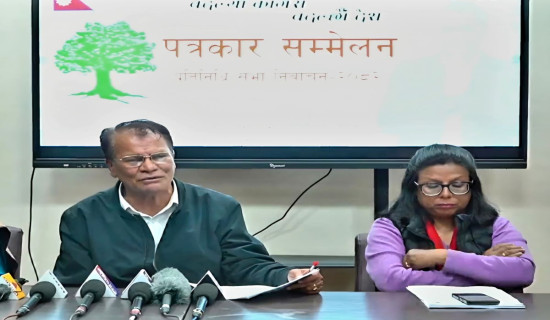- Monday, 23 February 2026
Encourage NRNs To Contribute To Homeland
Nepal is a least developed country awaiting development in various sectors to make its people happy and prosperous. The country depends on internal resources and foreign aid and grants for the initiation of development works. In this regard, we can seek the help of non-resident Nepalis (NRNs) scattered throughout the length and breadth of the world to supplement the funds required for development works. The NRN movement gained momentum with the establishment of the Non-Resident Nepali Association (NRNA) in London in 2003 at a time when the Maoist insurgency was raging in the country. The NRNA is a common platform for NRNs. The association provides a platform for NRNs to help the country improve its economy by sensitising them to their responsibility towards their motherland and by harnessing their potential.
The NRNA has an identity of its own and functions as a brand all over the world. It works in coordination and collaboration with other such Nepali organisations established in foreign countries. In accordance with the statute of the NRNA, an NRN is a foreign citizen of Nepali descent or a Nepali citizen engaged in business and/or professions abroad, excluding SAARC countries, for the last two years or more. However, Nepali citizens deputed to foreign missions by the Government of Nepal or Nepali students pursuing studies in various educational institutions in foreign countries are not counted among NRNs.
Varies objectives
The objectives of the NRNA are varied. Some of its objectives include uniting all the NRNs living in different countries, promoting and safeguarding the interests of NRNs, mobilising contributions of NRNs in the interest of Nepal and functioning as a non-profit social organisation. Likewise, the functions of the NRNA include, among others, organising global and regional conferences and interaction programmes, facilitating and promoting interaction between NRNs, resident Nepalis and Nepali organisations worldwide, liaising with national coordination councils, Nepali associations abroad, government organisations and international organisations; and functioning as a forum for the promotion and protection of the interests of the NRN community both in Nepal and abroad.
The NRNA has proved to be a global network and is trying to bring all the NRNs into its fold. The association has been prioritising foreign direct investments for the development of Nepal since its first global conference held in London in 2003. The conference was attended by 203 NRNs from 32 countries. NRNs contribute to the economy of Nepal through investments in various sectors. They have invested in hydropower, tourism, agriculture, education, real estate, financial sectors, etc. During the initial days, they had to face legal hassles while making investments in the country. The law and policies existing then made it difficult to for them to make investments in the country. Owing to the strong lobbying by the NRNA, the law and policies have been relaxed to some extent with the result that the investment environment has been friendly now.
The removal by the Government of Nepal of the minimum threshold for investments to be made by NRNs through investment companies established in Nepal is a positive development. The threshold was Rs. 20 million. Likewise, the provision of citizenship for NRNs with social, economic and cultural rights has made them happy. These provisions are expected to boost NRN investments in Nepal. NRNs partner with the Government of Nepal and the private sector in development works with their resources, knowledge, expertise and experiences. They contribute to promoting Nepal’s culture and tourism and inspire foreign companies to invest in Nepal.
NRNs are also engaged in philanthropic and social work. They have contributed to constructing old age homes, mourning homes (kriyaputri bhawans), hospitals, roadways, water supply systems and so on. They have also helped Nepal during natural disasters. During the 2015 devastating earthquake, they contributed Rs. 350 million in the form of relief materials. NRNs give advice to the Nepalis going abroad for foreign employment. Foreign employment is an attractive option for most Nepalis who cannot find jobs in the country. However, foreign employment is not hassle-free. Many Nepalis going on foreign employment are bearing hardships in foreign countries. NRNs enlighten such Nepalis on prospects and challenges of working abroad, making them aware of how to deal with the situation in foreign countries.
Awareness programme
In fact, an awareness programme is indispensable for those going abroad for foreign employment so that they do not have to face hardships and hassles abroad. Nepal can benefit a lot from NRNs. The NRNA is a big network consisting of wealthy or influential people and skilled manpower – doctors, engineers and even scientists. As stated above, they have invested in various sectors of the economy, creating jobs for thousands of people. They are investing in the country but this is not enough. The government can attract even more NRN investments. The country is graduating to the status of a developing country in 2026. For this, investments in infrastructure development are required. NRNs can play a catalytic role in accelerating infrastructure development in the country.
NRNs can also work as ambassadors for Nepal in foreign countries. By doing so, they can convince foreign companies to invest in the country. But the Government of Nepal should create an investment-friendly environment. The government should improve the doing business environment. The government should provide NRN entrepreneurs with various concessions – such as by reducing taxes. After all, NRNs have Nepali blood. Wherever they are, they have a strong bond with Nepal. They promote the culture of Nepal; they observe Dashain, Tihar and other festivals, no matter where they are living. The government should recognise the contributions of NRNs to its economy and further encourage them to boost and consolidate their contributions to the country.
(Maharjan has been regularly writing on contemporary issues for this daily since 2000.)
















